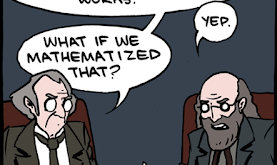Heterodox economics and economic anthropology: reflections prompted by two books Working paper N. 807 Luglio 2019 Sergio Cesaratto DEPS, USienaAbstract This paper has been long ago inspired by Jared Diamond (1997) and, in particular, by his extensive use of the concept of economic surplus as the key to the development of civilization. Unfortunately, Diamond does not even mention the origin of the concept in classical and pre-classical economics. Moreover, Diamond does not pay...
Read More »On Karl Polanyi and the labor theory of value
The other great transformation I have discussed Polanyi on the blog before, but not in great detail (see this video posted a few years back from Fred Block for a more in depth discussion). However, writing about Bob Heilbroner's views of economics, and in particular the labor theory of value, reminded me why I have reservations about Polanyi, something that often surprises my friends, since I often cite some of his ideas, and I did put his book on the Top 10 list.Polanyi has been,...
Read More »The Contemporary Relevance of Karl Polanyi
The political economist Karl Polanyi, author of the 1944 volume The Great Transformation: The Political and Economic Origins of Our Time, is arguably better known today than during his lifetime. The time has come for a major biography of Polanyi, Karl Polanyi: A Life on the Left by Gareth Dale. It is thoroughly excellent and provides the occasion to ponder the relevance of Polanyi today. His book was a response to more than a century of globalization that fell apart in the 1920’s and 30’s,...
Read More »Economists don’t read (enough) books
So Ann Petiffor twitted a link to a post on why economists do not read Polanyi's The Great Transformation (or the other GT; yes the one is Keynes' General Theory) The author, Marko Grdesic, basically suggests that economists do not read books, period.* I would add, let alone Polanyi that was always at the fringes of mainstream economics. He estimates that about 3 percent of economists have read Polanyi. That reminded me of a story that Eichengreen had told me about a course he taught...
Read More » Heterodox
Heterodox


